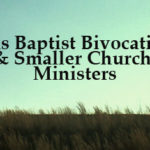SAN ANTONIO—The secret to consensus building in churches rests in asking the right question, mediator and author Blake Coffee told a workshop during the Texas Baptist Family Gathering.
“Usually, we ask, ‘What do you want?’ … The highest value in the New Testament church is God’s will. The question should be, ‘What does God want?’” said Coffee, founder and executive director of Christian Unity Ministries.
 Blake Coffee, executive director of Christian Unity Ministries.Congregational governance offers the benefit of multiple viewpoints and collective wisdom, but it should not center on winning a majority in a vote based on personal preferences, he suggested.
Blake Coffee, executive director of Christian Unity Ministries.Congregational governance offers the benefit of multiple viewpoints and collective wisdom, but it should not center on winning a majority in a vote based on personal preferences, he suggested.
“Five hundred heads are better than one. We need all the perspectives we can get. But what we want is not even relevant,” he said.
If a church wants to move forward toward consensus, it requires a cultural shift from emphasis on the priesthood of the individual believer in isolation toward emphasis on the priesthood of all believers gathered in community, Coffee said.
“It is an eternal truth—we most often come to a fuller understanding of truth, a more effective discernment, in community with others than we do individually and alone,” he said.
Coffee pointed to the Jerusalem Council, recorded in the New Testament in Acts 15, as an example of how to handle controversial and potentially divisive issues in a congregation.
The Jerusalem church wrestled with the question of whether a male believer in Jesus needed to be circumcised before he could be considered a Christian—a sensitive matter that forced the church to deal with doctrinal questions, racial issues and religious traditions.
Coffee noted the Jerusalem Council listened to respected leaders, each of whom offered a valuable perspective on how to find God’s will.
Sign up for our weekly edition and get all our headlines in your inbox on Thursdays
The Apostle Peter taught the church a lesson about prayer, he said.
“Prayer is the regular and gradual process of learning to see the world through God’s eyes,” he said. “It involves a shift from seeing prayer as our way of influencing God to seeing prayer as God’s way of influencing us.”
Church members not only need to pray privately, but also need to pray together, he stressed.
“We get up in arms about whether we can pray at a football game on Friday night, but tumbleweeds blow through many of our churches on Wednesday night,” Coffee said.
The Apostle Paul and his coworker Barnabas taught the Jerusalem church the importance of discerning God’s will through circumstances, he noted.
“To see God in circumstances, we must be intentional and careful not to attribute our man-sized accomplishments to God and not to attribute God’s Spirit-filled activity to men,” he said.
That involves a shift from measuring success in terms of numbers and dollars to focusing instead on the degree to which lives are changed, he added.
James, the pastor of the Jerusalem church, called his congregation to seek direction from God in Scripture, Coffee said.
“We see God most clearly and unmistakably in Scripture. The more time we spend in it, the more recognizable God becomes to us in the world around us,” he said.














We seek to connect God’s story and God’s people around the world. To learn more about God’s story, click here.
Send comments and feedback to Eric Black, our editor. For comments to be published, please specify “letter to the editor.” Maximum length for publication is 300 words.